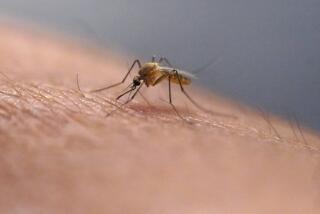Dengue fever and mosquitoes: A way to stop the spread?
- Share via
The dengue fever virus, which infects 50 million to 100 million people around the world every year, might possibly yield to a little bacterium called Wolbachia, if research just published in Nature pans out.
And that could be big: Researchers have been trying for years to find ways to control the mosquitoes that spread dengue fever and malaria. They’ve not had much luck so far.
Instead of attempting to kill the dengue virus’ carrier -- the mosquito Aedes aegypti -- the trick in these experiments was to infect the mosquitoes with a strain of Wolbachia. The Wolbachia doesn’t kill mosquitoes, but it gets in the way of replication of the dengue virus inside the insects.
The Wolbachia strain used by Scott O’Neill of Australia’s Monash University and colleagues was one called wMel that infects the famous fruit fly Drosophila melanogaster, studied for decades in genetics labs. wMel infects wild-living Drosophila all over the world today. And -- tantalizing to the scientists -- wMel interferes with certain virus infections in the flies.
O’Neill and coworkers thought the same thing might happen with dengue if they got that same strain of Wolbachia into mosquitoes.
So they set about doing it through a long, tricky process that took years: getting Wolbachia from Drosophila, culturing it in mosquito cell lines for a couple of years so it could get used to a new mosquito-like cell environment, injecting it into Aedes egyptii embryos, culturing cells from THOSE embryos for a while and then -- phew -- getting the bacterium into female Aedes aegypti mosquitoes for breeding.
(Let it never be said that working with mosquitoes is easy. For one thing, sometimes scientists feed their captive mosquito colonies by sticking their arms in cages. At one point in this study, scientists were scratching their heads about a lower mosquito number in one cage; two geckoes had gotten in there and were busy feeding on the insects.)
The researchers could see that wMel bacteria infected many parts of the mosquitoes, including -- importantly -- the ovaries. When female mosquitoes bred, the infection was passed on, and so the Wolbachia spread.
Next came the dengue-controlling tests. Mosquitoes were fed a blood meal infected by a strain of the dengue virus. Fourteen days later, the scientists detected 1,500 times lower amounts -- sometimes even lower than that -- of the dengue genetic material in the wMel-infected mosquitoes than similar ones that weren’t infected.
Moving on to mosquito saliva, the scientists found that Wolbachia-infected mosquitoes didn’t have dengue virus in their spittle. This suggested that when they bit human hosts and injected their saliva, the virus would not be passed on.
But that’s in a cage. What about real life? The researchers turned to that next.
In January and over the next few months, they released about 150,000 wMel-infected adult mosquitoes into the wild at two separate locations near Cairns in Australia where natural A. aegypti populations live and where dengue fever sometimes strikes.
(The plan was vetted and approved by authorities and the citizens of the two towns, Yorkeys Knob and Gordonvale.)
Placing traps and then analyzing the mosquitoes they caught, they found that the Wolbachia infections spread steadily even after they stopped releasing new mosquitoes, pretty much invading the entire population in Yorkeys Knob by five weeks after the last release and 90% of the mosquitoes in Gordonvale. (A tropical cyclone in early February interrupted the scientists’ experiment, but they soldiered on.)
There were also signs that the infections were spreading to mosquitoes outside of the field trial area, into a suburb in one case and across a freeway in another case. The researchers don’t expect it to spread too much farther in this case -- but it does at least show that wMel-containing mosquitoes could spread.
“These studies … herald the beginnings of a new era in the control of mosquito-borne diseases,” writes Jason L. Rasgon, a scientist at the Johns Hopkins Malaria Research Institute in Baltimore, in a commentary accompanying the two papers. The strategy could also be tried against malaria, he adds.
What’s needed next, he writes -- and it’s far from certain what would happen when this is tried -- is to test the strategy in a place where dengue is entrenched, for instance in Southeast Asia or South America.
The trick to the strategy working so well in these experiments was that the Wolbachia-infected mosquitoes not only passed on the infection but also survived and bred well enough so that infected mosquitoes wouldn’t simply die out. The wMel Wolbachia strain seems to allow for this; the same strategy didn’t work when tried in the past with a different strain of Wolbachia.
Dengue fever virus is nothing one wants to encounter. Here, from the CDC, is a look at the virus and the sicknesses it causes, which are dengue fever, dengue hemorrhagic fever and dengue shock syndrome.






